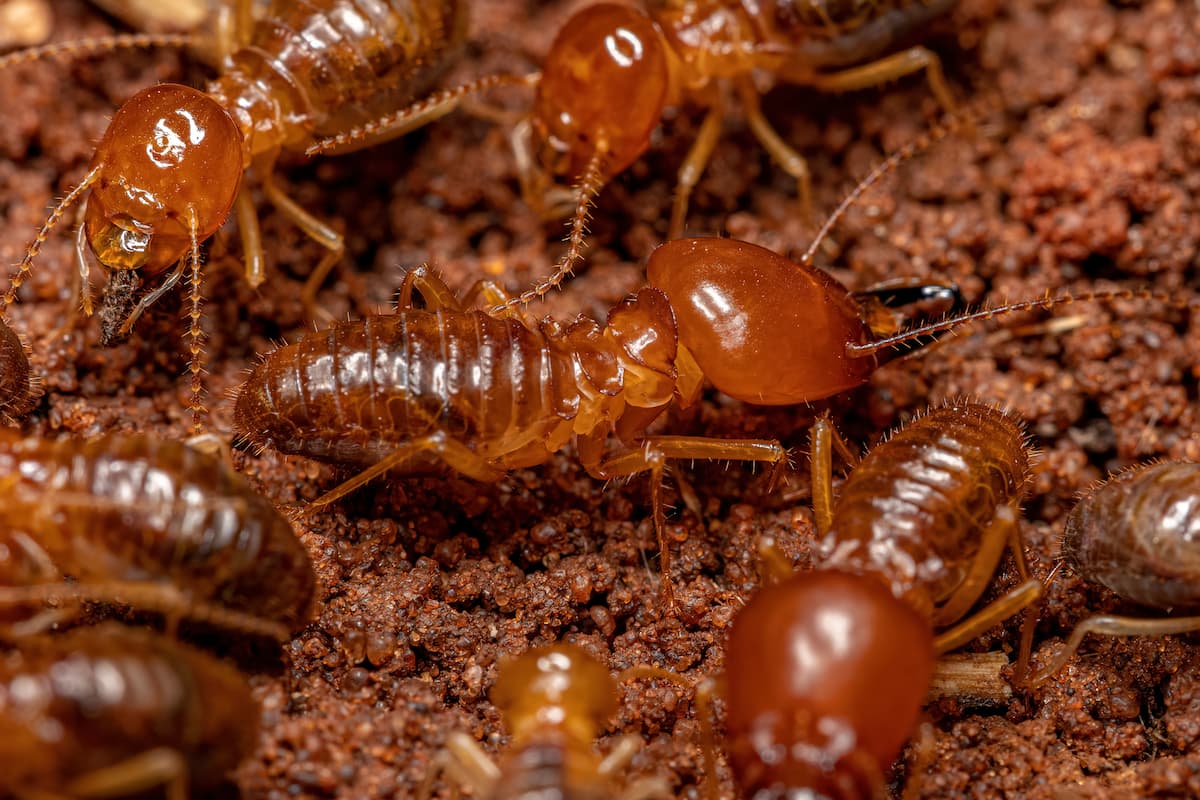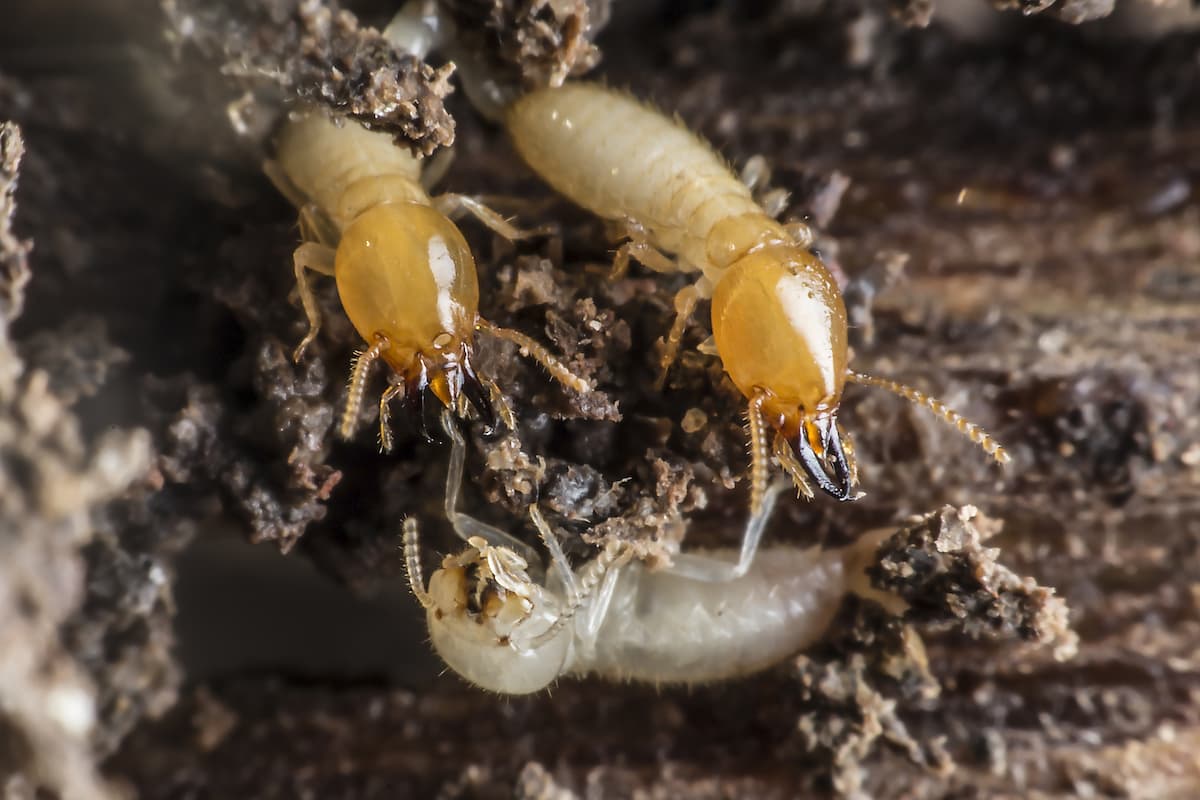Do Termites Serve A Purpose?
Since termites are such irritating pests, it can be easy to assume they have no other job besides just being annoying to humans.
Termites do serve an essential purpose in the environment as decomposers. The role of decomposers is to break down dead organic matter so that the nutrients contained in various materials can return to the soil. Termites also help to prevent erosion, serve as food for certain animals, and perform other critical roles in the environment.
What Other Purposes Do Termites Serve?

Termites are very important for maintaining the health of the environment. In the following sections, I will detail the various essential roles termites play toward helping our environment.
1. Termites Return Nitrogen To The Soil
If you know anything about gardening and landscaping, then you understand how critical certain nutrients are to soil.
And out of all the nutrients required to grow healthy plants, nitrogen is one of the most essential ones. Luckily, termites’ bodies have plenty of nitrogen.
You see, termites contain nitrogen because they have a ton of it living in the bacteria inside their guts.
So, when a termite poops or dies, or when an animal that has eaten a termite poops it out, the nitrogen in the termite’s gut returns to the soil.
This nitrogen cycle is important because plants need nitrogen to grow, create chlorophyll, and perform photosynthesis.
2. Termites Aerate The Soil
Again, just about anyone who’s interested in gardening and landscaping probably knows about the importance of aeration.
Aeration is the act of poking holes in the soil so that water, nutrients, and air can get deeper below the surface of the dirt.
Termites help to aerate soil by digging down into the ground, which creates pathways in which these crucial elements can travel.
When water, air, and nutrients are able to penetrate the soil, more plants can grow.
Aeration caused by termites also makes soil less compact, making it easier for roots to branch out.
3. Termites Recycle The Nutrients Found In Trees, Sustaining Entire Ecosystems
As decomposers, termites break down old, dead matter so that essential nutrients can return to the earth.
Basically, this process occurs as termites eat wood and other dead plant matter, at which time they swallow their nutrients.
Then, when the termite dies or poops, the nutrients they have retained from the dead plants return to the dirt.
Trees and other plants can then use these nutrients to grow and create energy.
Later, once the plants mature, herbivores consume them, which provides the animals with the nutrients they need to live, such as nitrogen.
Next, carnivores eat the herbivores, giving them the same life-sustaining nutrients.
Since all of these nutrients come about from the recycling actions of the decomposers, you can see why insects like termites are absolutely essential to all life on earth.
4. Termites Help Prevent Erosion
Erosion takes place when the top layer of soil gets washed away, usually by rain.
Erosion is a problem because it makes land less fertile for farming, increases an area’s chance of flooding, and pollutes waterways.
However, termite feces is so sticky and common in termite-heavy regions that it holds soil in place so that erosion doesn’t occur as quickly.
5. Termites Clear The Way For New Trees
Since termites eat dead matter, they actually clean the forest floor and make it less crowded.
With less waste on the ground, new plant life has an opportunity to spring up.
6. Termites Provide Food And Nutrition For Other Animals
Plenty of animals, including ants, bats, mongooses, and various species of birds, eat termites.
There are even some people who like to eat these insects.
And termites are a pretty good choice for a meal, since they are full of protein and nutrients.
7. Termites Help Prevent Desertification
Desertification occurs when land that was once fertile becomes desert-like.
This process is problematic because it means crops can no longer grow in that area.
Desertification can also destroy ecosystems.
However, since termites are so good at aerating soil and providing nutrients, oases tend to spring up around their mounds.
Is It Bad To Kill Termites?
Even though termites play an essential role in the preservation of our environment and many ecosystems need them to survive, it is okay to kill termites if they pose a danger to your home.
Just like all other creatures, we need a sturdy and reliable place to live, and we can’t really have that if termites are eating away at our homes.
This means that if termites have gotten into your home, they should be eliminated.
If you don’t eradicate a termite infestation, they will make your home dangerous and eventually eat every scrap of wood you have.
Yet when it comes to exterminating termites that live outdoors, people’s opinions tend to be a little more mixed.
In general, if termites have set up a nest next to someone’s home or another structure, people typically get rid of them because they don’t want them to come inside.
However, when the nest is far enough away from any building, some people prefer to leave them alone because of how important they are for the environment.
Meanwhile, others will still exterminate them because they don’t want to risk having termites migrate into their homes.
So if there are termites on your property but not too close to your home, it is really up to you whether you decide to exterminate them.
Are Termites Bad For Your Health?

Although termites are good for the environment, they can also be bad for your health if you live in a building that has been infested.
For one, termites can cause allergy symptoms and worsen asthma.
Since termites chew and tunnel in wood, they create tiny wood shavings, which can get into the air and affect people with sensitivities.
Similarly, termites tend to walk around in isolated parts of buildings, which means that they regularly kick up dust that can also circulate through the air and make people sick.
Additionally, termites tend to gravitate toward moist areas, and these places are most likely to house mold.
When termites crawl through mold, they get little spores on their bodies, which they then spread to other areas of the home.
Having mold in your home is a problem because it can cause respiratory problems.
Yet, for the most part, outdoor termites are generally not dangerous to your health because it’s much easier for tiny particles to disperse at safer levels outdoors than indoors.
Lastly, I want to note that termites do not transmit diseases to people, and their bites are not toxic.
Are Termites Good For Your Garden?
Since termites are beneficial to soil, you may start to wonder if they can benefit your garden too.
However, adding termites to your garden is not a good idea.
In nature, termites are important because they recycle the nutrients found in dead plant matter.
But, if termites don’t have dead plant matter to consume, they will start to eat living plants.
In the forest, this isn’t as big a deal, because the plants consumed by termites will die, in which case the termites will add more nutrients to the soil, which will help new plants grow.
However, in a garden, you’re typically trying to grow specific plants that you don’t want termites to kill.
So instead of using termites, you should utilize other methods to improve the quality of your garden soil.
Conclusion
Termites do serve an important role in the environment as decomposers, and are also a vital part of the food chain.
Table of Contents
- What Other Purposes Do Termites Serve?
- 1. Termites Return Nitrogen To The Soil
- 2. Termites Aerate The Soil
- 3. Termites Recycle The Nutrients Found In Trees, Sustaining Entire Ecosystems
- 4. Termites Help Prevent Erosion
- 5. Termites Clear The Way For New Trees
- 6. Termites Provide Food And Nutrition For Other Animals
- 7. Termites Help Prevent Desertification
- Is It Bad To Kill Termites?
- Are Termites Bad For Your Health?
- Are Termites Good For Your Garden?
- Conclusion
